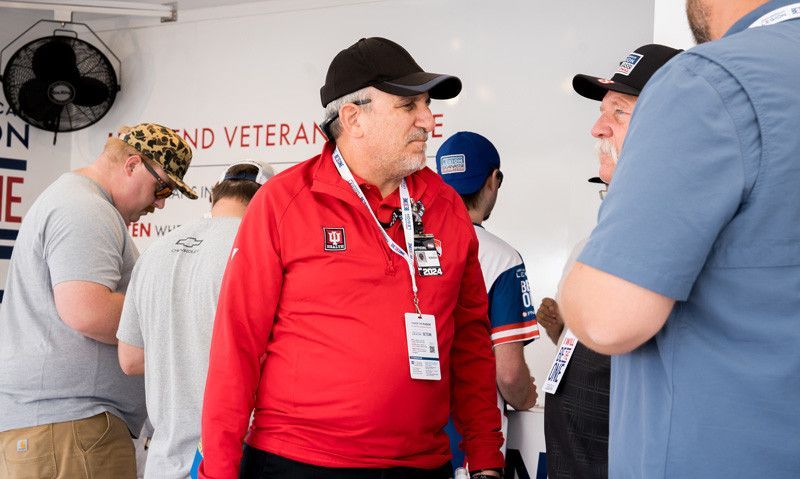
INDYCAR optometrist and Legionnaire talks growing up in Legion family, path to INDYCAR and importance of Be the One.
Throughout the 2024 NTT INDYCAR SERIES, American Legion Social Media Manager Steven B. Brooks is talking with military veterans who work within the INDYCAR SERIES, whether for Chip Ganassi Racing, INDYCAR itself, or other racing teams, tracks or entities involved in the series.
This week we’re featuring Dirk Titus, a U.S. Navy veteran who has served as an optometrist for INDYCAR for more than 19 years – three years less than his wife, Denise, has worked for the racing series, now as the medical liaison/coordinator. Titus served in the Navy and Navy Reserve from 1981 to 1996 in various locations before finishing up in Indianapolis. He retired from private practice last year and maintains membership in both The American Legion (PUFL member, Post 254, Rockport, Ind.) and the Sons of The American Legion (Squadron 1919, Greenwood, Ind.). His father, Allen, served as American Legion Department of Indiana commander and chairman of the National Security Commission.
Titus spoke with Brooks about his Navy service, his path to and role within INDYCAR, and the importance of The American Legion’s Be the One veteran suicide prevention program being featured in INDYCAR.
Steven Brooks: How did you end up in the Navy?
Dirk Titus: I went to Indiana University on a Child of a Disabled Veteran Scholarship that I got from my dad’s service. That covered four years of school, and I happened to be admitted to optometry school a year early. I applied for and was awarded an Armed Forces Health Scholarship, so that took care of my last two years of optometry school, knowing that I would owe (the military) some time. And dad, being a Marine in Korea, I kind of had that background that I wanted to serve my country. I saw dad continuing to serve his country through The American Legion. So, it was partly selfish to help pay for my school, and partly I have a little patriotism in me, and I wanted to do something for my country.
Question: What brought you, nine years after getting out of the Navy, into INDYCAR?
Titus: When (Championship Auto Racing Teams) and the (Indy Racing League) split, my wife’s boss was the orthopedic consultant for the Indy Racing League. I became a fan – when you live in Indianapolis, it’s like a virus, the Indy 500 and everything – starting writing for an online publication. I would go to the races as a photo sports journalist while my wife was working with the racecar drivers when they crashed. And then she became the medical liaison for the league. So, she goes to all the races. So, I would hang out in the medical facility for a while, and Dr. (Henry) Bock, who was the medical director for INDYCAR at the time, found out that I was an optometrist. And the optometrist they had at the time … had talked to (Bock) about retiring. And he goes, “When Jerry wants to retire, do you want to do this?” So, to some extent, it was being in the right place at the right time. And I stepped right into it.
Question: What exactly does an INDYCAR optometrist do?
Titus: Basically, we do eye physicals. Now it’s in December. All the drivers came in … and they did a complete physical: EKG, bloodwork. And then obviously we have a criteria. They have to meet a minimum criteria to drive without correction or glasses or contacts or surgery. They can have glasses or contacts or have had refractive surgery and still meet that criteria. During the racing season I don’t really have much of a job. I still go to the drivable races so my wife doesn’t have to drive by herself most of the time. I’ll hang out in the medical facilities. And they consult me every now and then if somebody gets something in their eye. But mostly, it’s to do a thorough eye screening … to ensure their eyes are healthy and that they meet our minimum criteria, which is a little bit stricter than most racing series … because we drive on ovals.
Question: You had exposure to The American Legion at an early age. How did it shape your opinion of the organization?
Titus: I have a different perspective of The American Legion than the average person does, most likely. I grew in the Legion knowing it’s a whole lot more than a smokey old bar. I’ve seen the programs that help the youth. I was a (Hoosier) Boys State participant myself.
Question: Then having that background and involvement with the Legion, what does it mean to you to see the organization making veteran suicide prevention a priority through its Be the One program, and seeing INDYCAR, your employer, supporting that effort?
Titus: It makes me very proud that the organization has stepped up to do something. For years, I didn’t see anything being done through the VA, and a lot of men and women lost their lives because of it. Seeing the Be the One program come about, I am very, extremely proud of the organization. I’m trying to help as much as I possibly can. I do thank The American Legion for really promoting this Be the One. I’ve taken the (Be the One training) class from Columbia and try to encourage everyone at my post to take it. I think that can help us out a lot.
To learn more about Be the One, click here.
- Be the One

